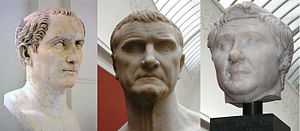Political history of the Roman military
In the Roman Kingdom the social standing of a person impacted both his political and military roles, which were often organised into familial clans such as the Julia.
[1] From Gaius Marius and Sulla onwards, control of the army began to be tied into the political ambitions of individuals, leading to the First Triumvirate of the 1st century BC and the resulting Caesar's civil war.
[3] In 100 BC, Lucius Appuleius Saturninus was tribune and advocated several social reforms, among which was a bill that gave colonial lands to war veterans, a suggestion that was radical and displeasing to the patrician Senate, which opposed the measures.
[5] The Roman Republic was always on guard against any citizen gaining too much prominence, lest he seize power and restore Rome as a kingdom; thus, a series of checks and balances existed, such as consuls having to be re-elected annually.
This was a momentous event, and was unforeseen by Marius, as no Roman army had ever marched upon Rome (it was forbidden by law and ancient tradition).
Marius fled with no great loss of life and Sulla later disbanded his legions and re-established consular government, but the military had been shown to be able to be used as a political tool of individuals.
Whilst he did not at this time use them for marching on Rome in direct furtherance of his own career, his desperation to rival the military campaigns of Pompey that led to recognition in the public eye means that his motives are unlikely to have been entirely selfless.
Rather, it was another step in the severance of the direct connection between state and troops that saw armies increasingly become tied to their generals' political careers.
[9] Unlike Sulla, Caesar also failed to revert power to the state when the threat of Pompey had been removed, not just keeping his position as de facto ruler of the state but, immediately on his return from defeating Pompey, naming his grand-nephew Gaius Octavius (Octavian) as the heir to his title, a wholly unconstitutional act.
Sulla and Caesar had managed such actions because the consular system of that period had concentrated in their hands a large proportion of the small number of armies in service of the state at the time.
Successful usurpers were usually either provincial governors, commanders of a large grouping of Roman legions, or prefects of the Praetorian Guard, which had control of Rome, where the Imperial palace still lay.
The problem of usurpation seems to have lain at least partially in the lack of a clear tradition enshrined in law and popular will of an agreed method of ensuring succession, and also in the maintenance of large standing armies.
Thus, provinces were slowly[citation needed] divided into smaller units to avoid concentration of power and military capacity in the hands of one man.
The maintenance of legions in a "strategic reserve" some distance behind the frontier and close to the emperors must also have been partially attributable to a need to preserve against rebellion by Roman border armies as much as against external invasion by an enemy.
He also established the Tetrarchy in 293 AD by appointing Maximian, who played the role of a co-emperor, as well as Galerius and Constantius Chlorus, who were subordinate but powerful nonetheless.

